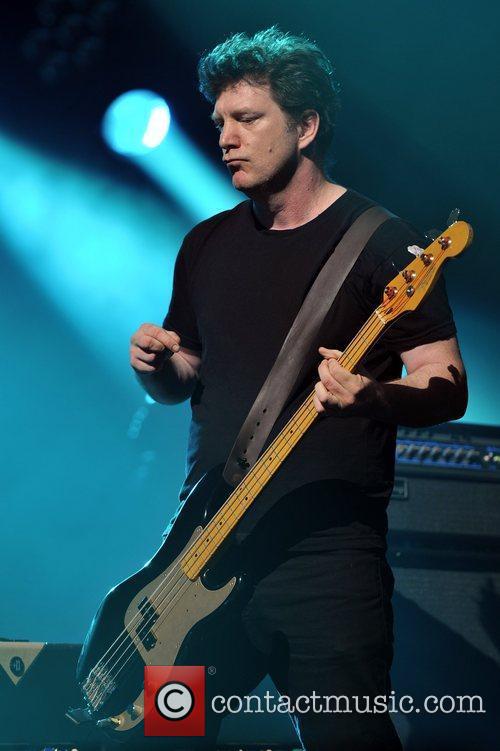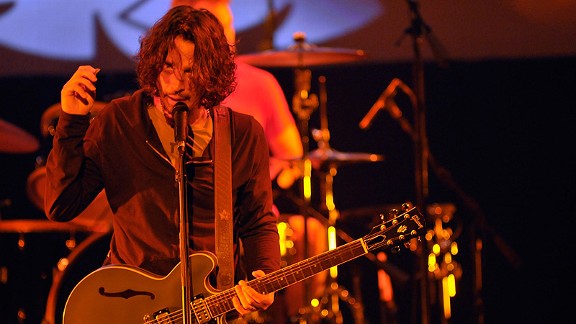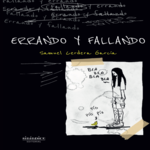Soundgarden – Directo en The Artists Den
Soundgarden – Live from the Artists Den
Soundgarden: Directo desde the Artists Den – «A Thousand Days Before»
Soundgarden: Live from the Artists Den – «A Thousand Days Before»
El concierto completo saldrá el 11 de julio, es decir, mañana.
IN ENGLISH
The full show will debut on July 11
Ben Shepherd sacará en agosto su primer disco en solitario
Ben Shepherd will release in august his first solo album

Sacado de // From: http://portalternativo.com
El bajista de Soundgarden, Ben Shepherd, ha anunciado que el 27 de agosto publicará el que será su primer disco en solitario, “In Deep Owl”, bajo el nombre de HBS, que corresponde a su nombre completo: Hunter Benedict Shepherd.
Su primera intención fue hacer un disco acústico con sólo su voz y guitarra, pero al final decidió que le echaran una mano dos buenos amigos: Matt Cameron, su compañero en Soundgarden y Matt Chamberlain, ex-batería de Pearl Jam.
De momento, cortesía de Spin podemos oír como suena una de las canciones que aparecerán en el disco, “Baron Robber”.
IN ENGLISH
Soundgarden bassist Ben Shepherd has announced that in August 27 he will release his first solo album, «In Deep Owl», under the name of HBS, which corresponds to its name: Hunter Benedict Shepherd.
His first intention was to make an acoustic album with just his voice and guitar, but decided to have helpt of two good friends, Matt Cameron (Soundgarden) and Matt Chamberlain, former drummer of Pearl Jam.
For now, courtesy of Spin we can the sound of one of the songs that will appear in the album, «Robber Baron».
Setlist del concierto de Soundgarden en México D. F.
Setlist of the Soundgarden’s show in Mexico city

Setlist:
Searching with My Good Eye Closed
Spoonman
Jesus Christ Pose
Rhinosaur
Burden in My Hand
My Wave
The Day I Tried to Live
Been Away Too Long
Never the Machine Forever
Hunted Down
Drawing Flies
Non-State Actor
Loud Love
Mailman
Taree
Outshined
Superunknown
New Damage
A Thousand Days Before
Fell on Black Days
Blow Up the Outside World
Rusty Cage
Encore // Bis:
Flower
Like Suicide
Black Hole Sun
Slaves & Bulldozers
Chris Cornell habla de cómo se mantiene en forma
Soundgarden’s Chris Cornell on staying fit

Sacado de // From: http://portalternativo.com and http://espn.go.com/
Chris Cornell, vocalista de Soundgarden, ha hablado con ESPN Playbook sobre como hace para, a sus 48 años, seguir en forma para dar conciertos de más de dos horas.
Durante años, no me sentía bien conmigo mismo. Mi cabeza no estaba limpia. No hacía nada productivo. Decidí que si me centraba en mi mente, el resto encajaría solo.
De su pasado recuerda:
De niño siempre estaba en forma. En EEUU, el ejercicio se centra en la imagen corporal y como te ves. Para mi, todo esta en la mente. Recordando mi infancia y recuerdo correr. Todos corríamos de aquí a allá. No era por ponerse en forma. Simplemente era lo que hacíamos.
Luego cuando logró el éxito como músico:
Todo va a la mente. Nunca sentaba bien a no ser que hiciera ejercicio. Si fueses psiquiatra, doy por hecho que era por propia imagen. No me gusta estar fuera de forma y necesitaba centrarme en mi ética de trabajo. Recuerdo antes de lograr el éxito cuando trabajaba en todos esos trabajos raros que hacía dominadas en la parte trasera de las cocinas en las que trabajaba. Nunca sabías la disponibilidad o tiempo o espacio. Lo encajaba ahí. Luego tenía periodos en mi vida en los que estaba inactivo. No me sentía bien. Me forcé a salir y hacer algo.
Prefiero no usar máquinas. Me centro mucho en el cardio, que es lo que hago cuando estoy en el escenario. También ando metido en ejercicios isométricos. Cuando me distraigo mentalmente, hago ejercicio. Siempre hago senderismo o andando estos días. Y sigo enamorado de mi mountain bike.
En este momento, hago tres conciertos seguidos durante más de dos horas y luego tengo un día libre. Ese es mi ejercicio. No hago nada en el día libre para poder prepararme para el próximo concierto. Necesito un día libre para descansar y poder ser capaz de cantar tanto tiempo.
IN ENGLISH
It’s probably too strong a statement to say that without exercise, Chris Cornell — lead singer of 1990s grunge band Soundgarden — wouldn’t be around anymore.
But it’s pretty close.
«For years, I wasn’t feeling good about myself,» said Cornell, who formed the Seattle band in 1984. «My head wasn’t clear. I was doing nothing productive.»
When Soundgarden hit it big with the 1994 album «Superunknown,» Cornell lived the typical rock star lifestyle: drugs, alcohol and no sleep. That was no different from other Seattle bands such as Nirvana, Alice in Chains and Pearl Jam.
Then, as with other bands, internal strife torpedoed Soundgarden in 1997.
«I decided I needed to work on my brain and not just my body,» said the 48-year-old Cornell. «I figured if I focused on my brain, that everything else would fall into place.»
It wasn’t an easy road as Cornell struggled to give up drugs and alcohol and focused on solo work and creating Audioslave (2001-2007). He then went solo again and reunited with Soundgarden in 2010.
These days, the band is touring off its sixth studio album, «King Animal.» Tuesday night, Soundgarden is performing in New Jersey.
Cornell, who rarely gives interviews, talked exclusively with Playbook about exercise, music today and life on the road.
What does being physically fit mean to you?
«It means I can do whatever I want without having to worry about it.»
You’ve been in the music business for years. How fit were you growing up?
«I remember as a kid that I was always physically fit. In the United States, workouts tend to focus on body image and how you look. For me, it’s really all about the brain. I think back to my childhood, and I remember running around as a kid. We were all running around then. It wasn’t about getting into shape. It’s just what we did.»
So what happened when you hit it big as a rock star?
«It goes back to the brain. It never felt right to me unless I was working out. If you’re a psychiatrist, I assume it was about self-image. I don’t like being out of shape and I needed to focus on my work ethic. I remember before hitting it big when I was working in all these odd jobs that I would do pull-ups in the back of kitchens that I was working at. You never know about availability or time or space. I would just wedge it in. I then had those periods of my life when I was inactive. I wasn’t feeling good then. I finally forced myself to get out and do something.»
So you decided to get back into shape. What did you do?
«I prefer not to use any machines. I focus a lot on cardio, which is what I do when I’m on stage. I also am into isometric workouts. When I’m mentally distraught, I work out. I’m always hiking or walking these days. And I still love my mountain bike.»
So now that you’re back on the road, do you get to work out?
«At this point, I’m performing three shows in a row for more than two hours at a time and then I’d get a day off. That is my workout. I don’t do anything on the off days so I can prepare for the next show. I need that day off to rest to be able to sing that long.»
You’ve been on the road for more than 20 years. What does touring in 2013 mean to you?
«I feel pretty much that I can do whatever I want. You need to be focused and get to that place. What’s important is to get into shape and then not to have to worry about it. I don’t want to get on stage and not being able to do something. Not being physically fit doesn’t work for me.»
What is today’s music business like?
«I consider where my place in the world of music is now. I’ve had a long career and I want to continue to have a long career. The way to do that is not to go away. Starting out in music today is a lot different. The methods of gaining an audience and communicating with an audience and how to monetize that audience is more challenging. Thankfully it’s very different for us. We already had an established career and people know who we are. It’s like the old method of attracting an audience.»
Is being out there still fun?
«I don’t think it is as much fun as [when] we were first did it. There is a lot of paranoia in this world. We used to travel around in a van and play these small venues, often in front of nobody. It really was hit or miss. We needed to get enough money to get a hotel room at the next place. That was more like what rock ‘n’ roll really is.»
But you wouldn’t have done anything differently, except maybe quitting smoking and drinking earlier.
«I was going to be a musician, no matter what it took. I supported myself with blue-collared jobs so I could write music and be in a band and play shows. I even got into an underground art scene. I was going to do whatever. I just had to pay rent and buy guitar strings. I look at my situation and realize how extremely fortunate I am that I can support myself and my family today. I’m getting to do what I love.»
